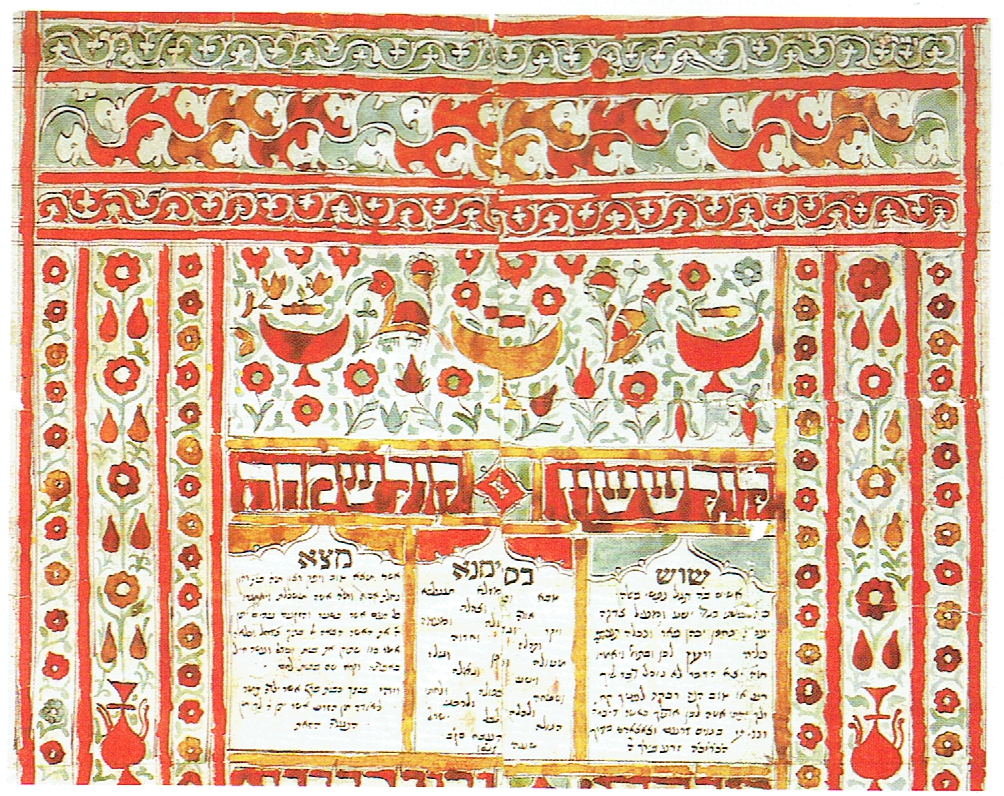Revised: 4-Sep-2012
In the whole of Luke’s gospel, there is just one context in which the verbs “divorce” and “marry” appear together. That passage—only one verse—ought to contribute to a correct understanding of Jesus’ attitude toward divorce and remarriage; however, there exists no scholarly consensus on the passage’s meaning.
Any man who divorces his wife and marries another commits adultery, and a man who marries a woman divorced from her husband commits adultery. (Luke 16:18)
In the first half of Luke 16:18, Jesus appears to teach that a man who has divorced his wife should not remarry.[1] In the verse’s second half, Jesus seems to say that no man should marry a divorced woman. Does this simplistic interpretation of a difficult verse do justice to Jesus’ approach to Torah?

Ketubah from Sena, Iran, 1908. Groom: The physician…Daniel, son of the physician Solomon. Bride: Habiba, daughter of the physician, Ephraim. Dimensions: 68.5 x 44 cm.
Luke 16:18 is very “Semitic,” that is, it is full of Semitic idioms, an indication that Jesus may have uttered the saying in Hebrew or Aramaic. Many scholars in Israel have learned that the most effective way to approach a passage from the synoptic gospels is, first, to put its Greek text into Hebrew, then, study the resultant Hebrew reconstruction in light of first-century Jewish exegesis.[2]
Paid Content
Premium Members and Friends of JP must be logged in to access this content: Login
If you do not have a paid subscription, please consider registering as a Premium Member starting at $10/month (paid monthly) or only $5/month (paid annually): Register
One Time Purchase Rather Than Membership
Rather than purchasing a membership subscription, you may purchase access to this single page for $1.99 USD. To purchase access we strongly encourage users to first register for a free account with JP (Register), which will make the process of accessing your purchase much simpler. Once you have registered you may login and purchase access to this page at this link:

- [1] Thus, apparently, Jesus would not consider a man an adulterer if he divorced his wife but did not remarry. ↩
- [2] The conclusions presented in this article grew out of a study of the nuances of the Hebrew word -ו (vav, and) that I carried out in the mid-1980s. I found that many of these Hebraic nuances were displayed in the Gospels by καί (kai, and), vav‘s Greek equivalent. The results of this study were initially published in 1987 (David Bivin, “The Hebrew Connection: Vav,” Dispatch from Jerusalem [1st Quarter, 1987]: 7), then revised and republished in 1989 (idem, [“Hebrew Nuggets” series,] “Lesson 17: ‘Vav [Part 1],’” Jerusalem Perspective 17 [Feb. 1989]: 3; “Lesson 18: ‘Vav [Part 2],’” Jerusalem Perspective 18 [Mar. 1989]: 3). ↩


























































Comments 2
Brother David,
how do you interpret I Cor 7, 34? There are two greek texts. In the versions based on the receptus it’s written:
“There is difference also between a wife and a virgin. The unmarried woman careth for the things of the Lord, that she may be holy both in body and in spirit: but she that is married careth for the things of the world, how she may please her husband.” (KJV)
But anothers translation are considerably different, like NIV:
“and his interests are divided. An unmarried woman or virgin is concerned about the Lord’s affairs: Her aim is to be devoted to the Lord in both body and spirit. But a married woman is concerned about the affairs of this world—how she can please her husband”
In the second translation there is a clear difference between the unmarried woman and the virgin (and the unmarried can’t be the widows – cheras).
If the second version were the true, I think it’s still more secure to understand that the declaration in the verse 39 is about just the married woman, and no the unmarried woman (divorced). And without remember about the possible reference to levirate marriage in the verse 39.
And I think, till now, that the second version is the true, because the same words were in the same sequece (or very almost) in the latin Codex Amiatinus, Codex Vaticanus, Codex Alexandrinus e Codex Sinaiticus, which were famous about their differences each other.
Sorry by my english e thank you, brother!
God bless you in Christ!
There remain many unanswered questions:
1. If a husband is guilty of adultery, and the wife divorces him, (or vice versa) are they then both free to remarry? (If so, how convenient for the adulterer!!)
2. What of the woman who divorces her husband because he abuses her (physically, psychologically, or otherwise). Is she not permitted to remarry?
3. It seems unfair that if a man divorces his wife in order to marry another woman, that his divorced (first) wife would also be considered an adulteress if she were to remarry. How can this be, if she has done nothing wrong to merit the divorce?